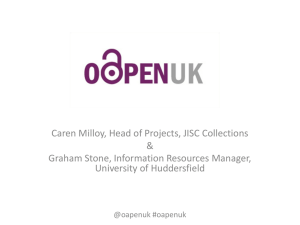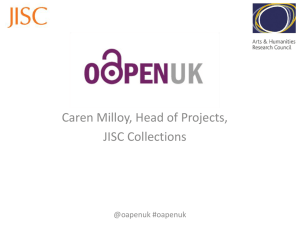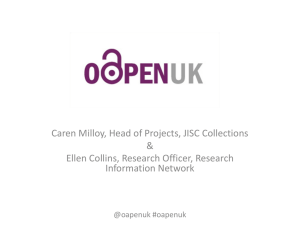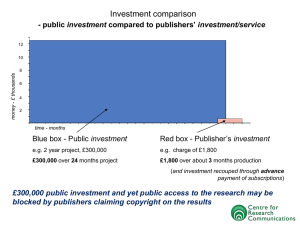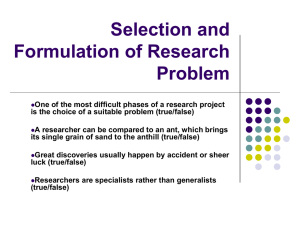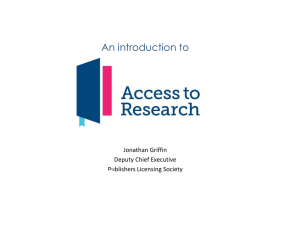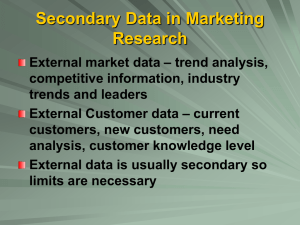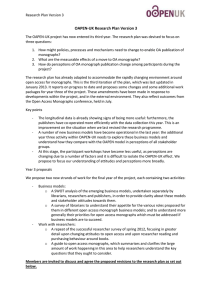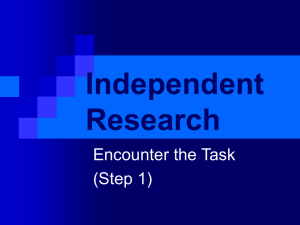OAPEN-UK presentation
advertisement
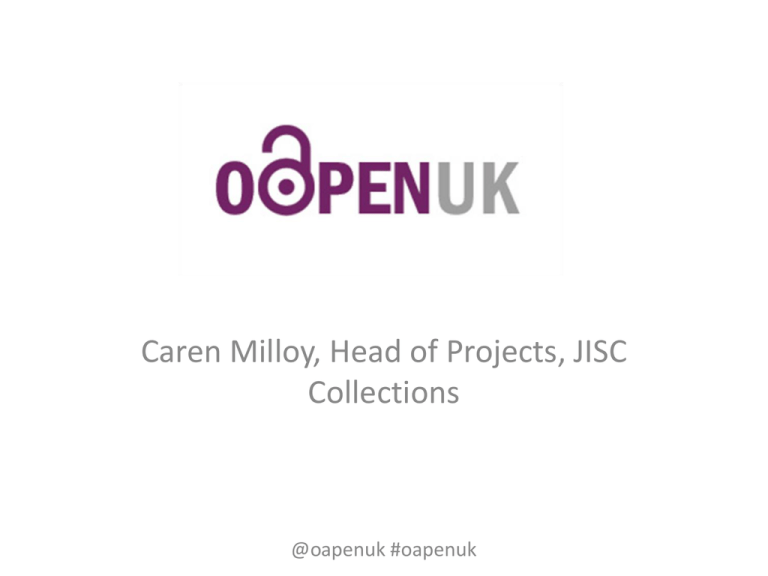
Caren Milloy, Head of Projects, JISC Collections @oapenuk #oapenuk ‘Scholars do not work in a vacuum; research is based on work from others and new discoveries must be disseminated in order to be used.’ Snijder,Ronald. 2010. The profits of free books - an experiment to measure the impact of Open Access publishing. http://sites.google.com/site/theprofitsoffreebooks/home @oapenuk #oapenuk 58 HSS titles: 2006 - 2011 Experimental Group (29 titles) OA with CC licence OAPEN Library Publishers website Institutional Repository Google Books (100%) Control Group (29 titles) Standard e-book agreements Publishers website E-book aggregators Google Books (10%) Print version available for sale E-book device friendly version available for sale @oapenuk #oapenuk Issues and questions 1. Deposit process 2. What is the institutional policy with regards to chapters v full book? 3. Identifiers @oapenuk #oapenuk Issues Is there a need for another PIRUS project to support the development of standards and protocols to support the analysis of usage statistics for OA monographs? @oapenuk #oapenuk The research programme 1.How policies, processes and mechanisms need to change in order to enable OA publication of monographs? 2.What are the measurable effects of a move to OA monographs? 3.How do perceptions of OA monograph publication change among participants during the project? @oapenuk #oapenuk Research process Initiation OAPEN-UK Research Plan Year 1 end Ellen Collins, Research Information Network Year 2 end Project end http://www.flickr.com/photos/stewart/461099066/ Focus groups 1. Institutional representatives including librarians, institutional repository staff, research managers 2. Publishers 3. Learned Societies 4. Researchers (as both authors & readers) 5. E-book aggregators 6. Research Funders @oapenuk #oapenuk Focus Groups: Key themes Metadata: What is the metadata Versioning, preservation & archiving: required to support discovery, What is the version of record, how is purchase, libraries, research funders? it preserved (centrally?) and who provides archival access? Usage: data collection methods and standards to support comparability of data Quality & prestige: impact of perceptions on adoption of a OA model and need to maintain excellence Methods of delivery: where should OA monographs sit, in what formats, with what functionality and using what standards? What do authors want: readership, research dissemination, academic prestige and reward including the REF Focus Groups: Key themes Copyright: ownership, licensing and rights associated with images International issues: not just UK market, need to account for territories, translation etc. Impact on processes: policies, mandates, funding routes, payment and behaviour Benefits of OA: how to articulate opportunities; access and costs savings? Changing roles: who does what in an OA model, what are the roles for publishers, librarians etc., which to keep, which to start and which to discontinue? Consistency: should licensing, standards, peer review be standardised? Does one size fit all? Focus Groups: Key themes Ways to make OA profitable: how can publishers / ebook aggregators add value to content? Overlay services Risk: how will the financial, reputational and quality risks be overcome? Funding: who pays and how? Calculating costs: what is the cost of an OA monograph and is it the same for all publishers, subjects? Researcher Survey Open Access awareness by discipline 70.0 Percentage 60.0 50.0 40.0 Never heard 30.0 Aware 20.0 Familiar 10.0 0.0 Social sciences Humanities Discipline @oapenuk #oapenuk Researcher Survey Percentage Open Access awareness by career stage 70.0 60.0 50.0 40.0 30.0 20.0 10.0 0.0 Never heard Aware Familiar Career stage @oapenuk #oapenuk Researcher Survey Awareness of Creative Commons against willingness to publish using Creative Commons No, I don't know enough about it 60.0 50.0 Percentage Maybe, I would need to look into it Yes, I would feel confident about doing this Don't know 40.0 30.0 20.0 10.0 0.0 Yes No Aware of Creative Commons? @oapenuk #oapenuk Researcher Survey Percentage Creative Commons licences considered by researchers 100.0 90.0 80.0 70.0 60.0 50.0 40.0 30.0 20.0 10.0 0.0 Yes No Don't know CC BY CC BY SA CC BY ND CC BY NC CC BY NC CC BY NC SA ND CC licence @oapenuk #oapenuk Researcher Survey Percentage Percentage of researchers prepared to consider CC BY-NC-SA licenses by career stage 100.0 90.0 80.0 70.0 60.0 50.0 40.0 30.0 20.0 10.0 0.0 PhD candidate Post-doctoral Assistant researcher professor / Lecturer Associate professor / Senior lecturer Career stage @oapenuk #oapenuk Professor / Reader Researchers outside academia Next up • Publisher interviews • Institutional case studies • VC meeting • DOAB • PIRUS @oapenuk #oapenuk Thank you & Further Info OAPEN-UK website: http://oapenuk.jiscebooks.org/ Caren Milloy c.milloy@jisccollections.ac.uk Twitter: @oapenuk Ellen Collins ellen.collins@researchinfo net.org Diigo Group: OAPEN-UK @oapenuk #oapenuk
